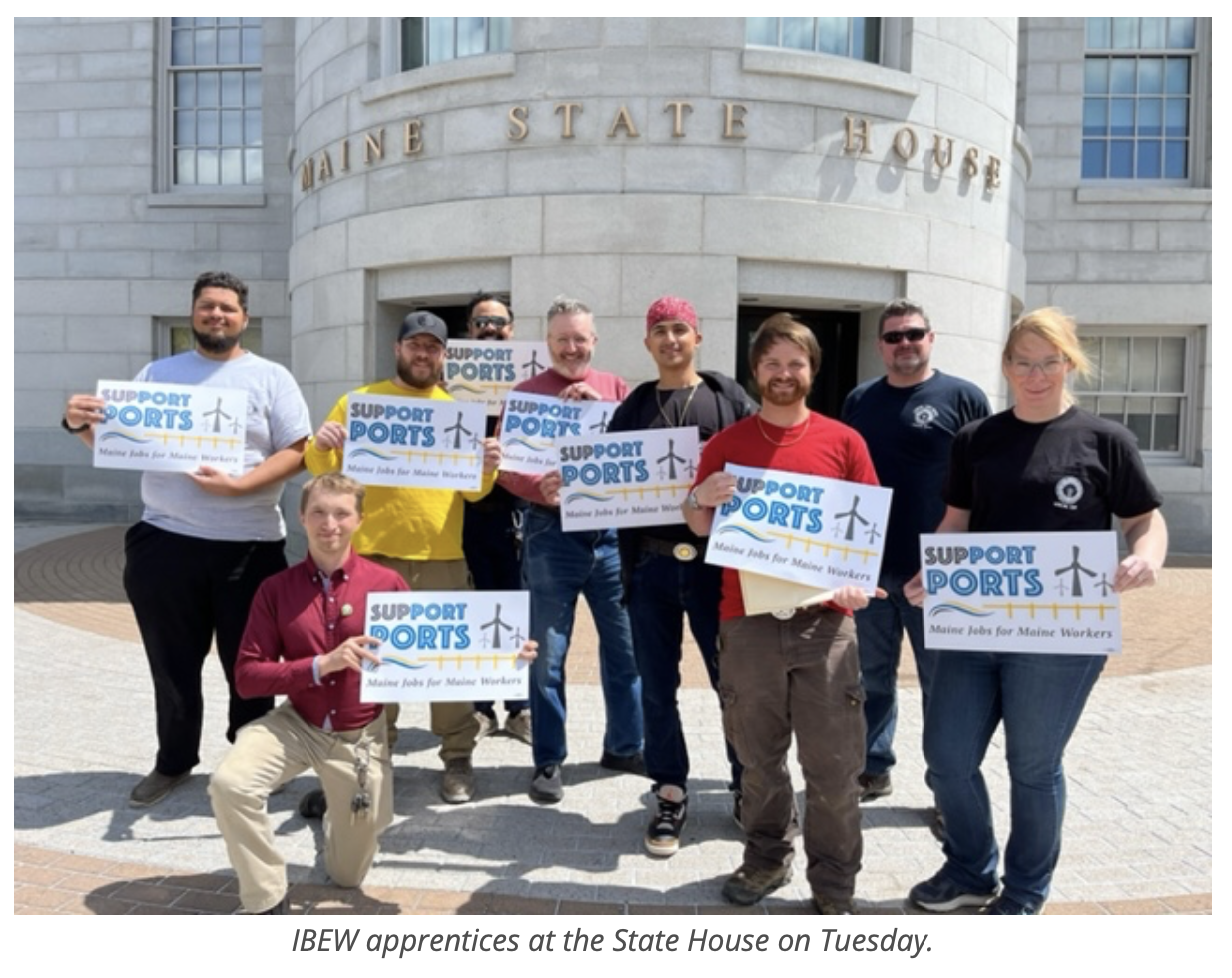Union Workers Back Bill to Require Strong Labor & Environmental Standards for Development of Offshore Wind

A broad coalition of union members, environmentalists, faith leaders and state lawmakers rallied on Tuesday in Augusta in support of legislation to ensure future offshore wind port facilities are required to have strong protections for workers and the environment. Several union apprentices from IBEW 1253 and 567, the Carpenters, Operating Engineers, and other unions testified at a public hearing about the benefits of robust labor and wage standards for working Mainers.
IBEW 1253 apprentice Kim Tobias, the daughter of the late USW activist and Bucksport mill worker Dan Lawson, said that much of the electrical work she does is on aging manufacturing plants like in the paper industry, which has shed thousands of union jobs in recent decades. She seldom gets to work on new large construction. She said that port facilities to develop offshore wind have the potential to revive Maine’s manufacturing sector and support thousands of well-paying union jobs in communities that have lost so many good manufacturing jobs.
“In Maine, people spend money where they make it,” Tobias told the Legislature's Labor and Housing Committee. “If we make the jobs at this port the best jobs it will benefit the local economy. Grocery stores, restaurants, realtors, car dealerships and anyone else who is part of that economy. It won’t just be the construction workers who benefit. Everyone will win.”
LD 1818, sponsored by Sen. Chip Curry (D-Waldo) has three major components:
- It requires offshore wind developers using state port facilities to create high quality jobs and maximize federal port funding opportunities by adopting strong labor standards;
- Requires developers to invest in local workforce development and prioritize the hiring of Maine workers, especially those from low-income rural communities; and
- Prioritizes worker safety and the environment by requiring port facilities to seek federal funding for zero-emission equipment, which reduces noise and pollution for workers and nearby communities.
The bill does not address where port facilities should be located, an issue that’s being considered by the Maine Department of Transportation and other important local stakeholders.

Union apprentices explained to the committee how much they value union protections after previously working in non-union jobs. IBEW 567 apprentice Phillip Joseph said he didn’t realize how underpaid he was compared to his coworkers until he left his non-union job.
“They were paying me less than people who had the same job description and less experience,” said Joseph, who is African American. “While I was working at that company we didn’t have recourse. We didn’t have a voice because at the end of the day the contractor had absolute control over our livelihoods. When I started working union, there was an immediate difference. Our job sites are safe. People can talk to each other. We have union stewards to protect us.”
Tom Smith, a non-union temp worker, said he supports stronger labor standards for offshore wind because he has experienced how exploitative it is to work in the solar industry, which does not have very high labor standards. He described how contractors have reneged on wages promised to him, stole from workers’ paychecks, discriminated against workers of color, refused to provide basic safety equipment and fired workers for protesting unjust treatment.
“I lived in the back of my car in subzero temperatures under a mound of blankets because they didn’t give us a housing stipend,” said Smith. “An eight-minute drive from here a worker was coaxed into crawling underneath a reel of cable big enough to crush a man and held only by a single piece of mule tape. It snapped just as he retreated.”
Non-union contractors like Cianbro, Reed & Reed and the Sargent Corporation opposed the measure because they ideologically oppose Project Labor Agreements (PLAs). However, as advocates for the bill pointed out, non-union contractors often bid on and win bids for PLA projects. One of the main opponents of the bill, Reed & Reed, recently worked on a large construction project under a PLA in West Virginia.
“We’re very proud of the work Reed and Reed did under a project labor agreement in West Virginia and we anticipate working with them on this project,” said Jason J. Shedlock, President of the Maine Building & Construction Trades Council. “And if not, that’s a business decision because if it’s good enough for West Virginia it’s good enough Maine.”
Shedlock and others also pointed out that the federal Infrastructure and Investment Act (IRA) prioritizes funding ports projects that have PLAs, so the legislation would put Maine in a better position to receive federal port funding.
Proponents of the legislation also argued that we will not be able to build the kind of working class support we need to make the transition from fossil fuels if policy makers don't put workers first and prioritize well-paying, family sustaining jobs with quality health care and retirement security.
“The transition that we need to make ASAP is one the largest we’ve ever made. It’s on the scale of the interstate highway system. It’s on the scale of the New Deal infrastructure build out. It’s on the scale of the Industrial Revolution,” said Matt Schlobohm of the Maine AFL-CIO. “So if we don’t get the economics side of this right so that workers believe in the transition, we will not get the climate side of it even close to right.”
The coalition behind this effort has worked very closely with unionized lobster fishermen and women with the Machinists union. Together, they've developed a plan to keep the siting of Offshore out of key fishing grounds in Lobster Management Area 1. The Maine AFL-CIO is backing this effort and working hard to create new union jobs in construction while protecting existing union jobs in the fisheries.
